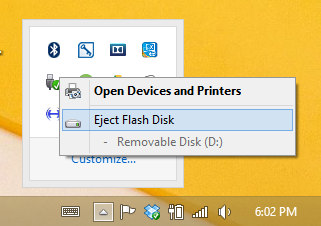
What does ejecting actually do?
When the drive is connected the computer has access to read and write to the device. This includes when you’re accessing the files on the device, as well as other software such as anti-virus software.
What’s important to note here is that as these read/writes occur the data is stored temporarily in the computers RAM. For example, a Microsoft Word document opened from a USB drive is stored in the RAM as your work on it and is only saved to the USB when you click ‘Save’.
Ejecting the drive before removing it does four things:
- Checks for any active files (open files) – ejecting will fail until files are closed
- Ensures the drive is not busy doing read/writes
- Ensures all writes are completed – that nothing is left in the RAM
- And finally, if your USB drive is mechanical allows the drive to stop spinning before it’s disconnected from the computer.
Why should I eject safely?
By ejecting safely you’re ensuring your files aren’t corrupted.
It does this by allowing files to close “gracefully”, preserving the data as well as other file meta data such as pointers and file size indicators.
If the drive is mechanical ejecting will also tell the drive to drop spinning, preventing the head from crashing onto the plate of the hard drive.
What happens if I remove without ejecting first?
Most of the time as long as you’re not currently writing to the drive absolutely no harm is done.
There is however a risk that other software is accessing the files such as anti-virus software, which would result in the files or potentially the whole drive becoming corrupted.
For mechanical drives, the sudden disconnection of power will result in the head crashing onto the plate – damaging the drive which will reduce the life span of the drive and potentially corrupt data.
What do I recommend?
If the drive is mechanical I always recommend ejecting safely – crashing a hard drive head is bound to cause damage and reduce the life of the drive.
If it’s a flash drive I think it comes down to how important the data on the drive is – there is a very small risk that the whole drive will be corrupted if you remove it too soon.
So the answer is – it depends on how much you respect the data.